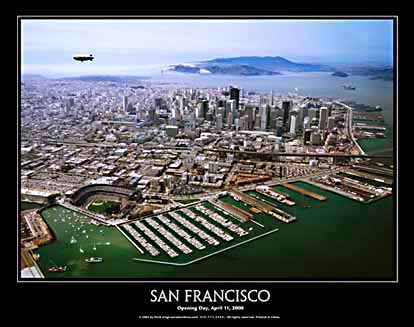...
The San Francisco Giants World Series run last year really brings home the ground truths and hard realities of the Major League Baseball playoff system as it is currently constructed. And when you think about it, most teams are building exactly the wrong kind of team to win a championship. The fascinating dichotomy here is that a team constructed to win, say, 95 out of the 162 games in the long, grinding regular season will be poorly constructed to win in the playoffs. And conversely, a team built to win three short series with plenty of days off in the fall chill will have a very difficult time even making the playoffs.
Now, I don't for a moment think it was brilliant insight that built the 2010 Giants, but rather a rare combination of circumstances and luck that produced a nearly perfect baseball team, one that could only barely (and with a great deal of luck and assistance from the late-season collapse of contending teams) squeak into the playoffs in the 162nd game of the year, but had exactly the right combination of personnel, skills, field management and mindset to be the first team out of eight to win eleven games. And that's precisely how you win championships in MLB.
People keep asking if the Giants can repeat. It's really kind of a stupid question. The answer is, if they can make the playoffs again, then yes. You'd have to consider them one of the favorites to win it all. But therein, as that noted baseball analyst Bill Shakespeare said, lies the rub. The Giants realistically have a less than 50% chance of getting back into the post-season, and even that only because the Dodgers are so epically bad, weakening the Western Division to the point where it's a toss-up between the Giants, Rockies and Padres. And no, there's virtually NO hope that the wild card will come out of the West, so it's win the division or start making plans for November hunting trips.
One of the ideas I've come to appreciate more over the winter since the World Series is the concept that one of the key reasons the Giants won it all in 2010 is that they put together a team without a superstar. Now, one can argue that with 2 Cy Young awards under his funky young belt, Tim Lincecum is a superstar, but I think the idea focuses more on an offensive power, a Barry Bonds, an Albert Pujols, an Alex Rodriguez. I think that there may be something to that, though to what extent it might be decisive is an open question. But just as people designing networks shy away from single points of failure, just as they value redundancy, backup and failover, having a lot of good interchangeable pieces might be superior to having a few irreplaceable parts.
The other underestimated piece is Bruce Bochy. He is that rare combination of high quality clubhouse manager and excellent field manager. The way he used his resources without creating hurt feelings or animosity was nothing short of brilliant. After watching the best San Francisco team EVER lose the world championship due to the managerial incompetence of Dusty Baker, the way Bochy handled this team down the stretch and through the playoffs tells you all you need to know about his value to the organization.
So we're a few weeks from Opening day, with the championship team largely intact. This year's aging veteran shortstop is Miguel Tejada rather than Edgar Rentaria, but with Mark DeRosa healthy and Pablo Sandoval looking like he's going to try to take his opportunities seriously, the Giants are left with only two questions: What to do about Barry Zito, and the Too Many Outfielders Problem.
And those should serve as fodder for the next time I feel like writing a Baseball post.
...
Subscribe to:
Post Comments (Atom)

the Too Many Outfielders Problem.
ReplyDeleteLet's play four!
~
Back to 154 games, I say!
ReplyDeleteWill be contacting you soon for help with my fantasty league!!
ReplyDeleteI recommend winning six out of every ten games rather than five out of ten games and then hope you're lucky in the playoffs.
ReplyDelete